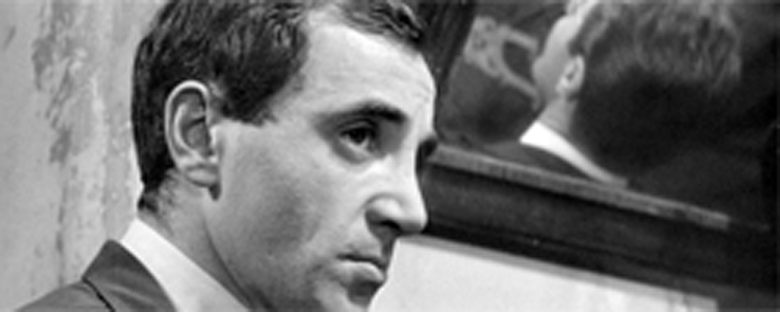Reviews
Tirez sur le pianiste
François Truffaut
France, 1960
Credits
Review by Tom Huddleston
Posted on 17 May 2006
Source The Criterion Collection DVD
It’s easy to see why contemporary French critics found François Truffaut’s second film so perplexing. After all, until recently the director had been one of them, a voyeur, and his first film had been an unqualified triumph, spearheading an entirely new movement in French cinema. Shoot The Piano Player must, to some, have felt like a retrenchment. The director’s stated ambition was to make something aggressively ‘anti- French,’ to ‘pay a debt’ to the American cinema that he loved. So, a hardboiled gangster film, a whirlwind romance, and a story of fame lost and found- what could be more American? In fact, as with Breathless, the prismatic filtering of familiar Americanisms through a deferential Gallic lens now seems more French than anything before or since. The cigarette in curled lip, the pistol thrust into a pocket, the car screeching through traffic—these are as familiar to us as symbols of France in the ‘60’s as of America two decades before.
It’s impossible to believe that a director with as much apparent intelligence as Truffaut could be so lacking in self awareness, about his work and its intentions. Did he really believe he was making something Bogart might have appeared in, or his beloved Sterling Hayden? Because Shoot The Piano Player is so much more than a slavish copy of American noir. The film is extraordinary, irreverent and dramatic, simultaneously complex and naïve, realistic and ludicrous. It’s a character study as much as a thriller, and what a character—an introverted, tight lipped pianist, a ‘shy person,’ as Truffaut describes him, hardly the natural focus for a crowd pleasing crime drama. Almost every element of the story is admittedly familiar—Charles Aznavour’s down-at-heel piano player becomes embroiled in his family’s criminal exploits, meets a beautiful girl and falls in love, recounts his rags to riches story and eventually loses everything, finding himself right back where he started. It is the treatment of the material that is unique, a gleeful irregularity of tone that is all Truffaut.
Which isn’t to say that there is no history of absurdity in American noir, no humour or childishness, no raw tragedy or emotion. But Truffaut piles these seemingly incompatible sensations on top of one another, glancing from fear to comedy, from hope to tragedy, an emotional trainwreck crammed into 81 short minutes. And there is still room for multiple asides, both funny and pathetic: the opening discussion on the nature of love which interrupts Chico’s headlong flight, Ernest and Momo’s attitude to women, the celebrated moment where one character swears ‘may my mother fall down dead,’ which of course she does. The tendency to give even bit parts character is very noirish, but to make those characters so ordinary, so uninspired and even ignorant takes genuine bravery.
Such a freewheeling approach has its problems. The jarring effects of a tragic scene are rarely allowed to settle in and provoke an emotional response before it’s time to move on to something new. There’s the first hint of that sly veneer of movie-brat intellectual pretension that crippled the Nouvelle Vague, so pleasantly absent in The 400 Blows but inevitable here—a certain level of familiarity with the clichés of noir is smugly assumed. The characters are rich and realistic, but Truffaut can’t help stepping away from them on occasion to give the audience a quick, playful poke in the ribs—Plyne’s easy, almost insignificant death cheapens the film, played for laughs rather than genuine drama. And in a film so short it’s inevitable that some of the characters will be underused, but it’s a shame we never get a real sense of Edouard’s relationship with his baby brother Fido, or much of a sense of Lena beyond her obsession with Edouard.
But these are minor regrets in the face of such a vibrant, inventive piece of work. In Edouard, the film presents a character achingly familiar but heretofore underrepresented onscreen—the hesitant romantic, the silent, self-loathing artist, affectionate but alone. His faltering approaches to Lena, his first return to the piano, his fond reminiscences of his brothers’ outrageous behaviour—all of this serves to paint a vivid picture, filled with contradictions. We’re never sure if Edouard is genuinely helpless, or just unwilling to help himself. Is he really a victim, or does he simply give up too easily? A question most of us have been faced with at one time or another.
We don’t do comments anymore, but you may contact us here or find us on Twitter or Facebook.



